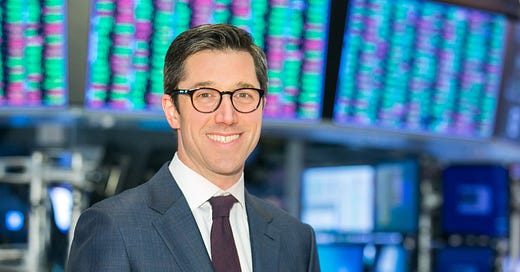This article is part of Fintech Leaders, a newsletter with over 60,000 builders, entrepreneurs, investors, regulators, and students of financial services. I invite you to share and sign up! Also, if you enjoy this conversation, please consider leaving a review on Apple Podcasts, Spotify, or wherever you get your shows so more people can learn from it.
Michael Blaugrund is the CEO of DriveWealth, a fintech platform and broker-dealer enabling investing products for businesses and consumers worldwide.
Founded in 2012, DriveWealth works with over 100 corporations in almost all continents, including Revolut, BTG Pactual, GBM Mexico, MoneyLion, and many more. They have raised over $550 million from Accel, Point72, Insight, Greyhound, and many more.
Prior to DriveWealth, Michael held leadership roles at Nasdaq and NYSE, most recently serving as COO of the NYSE.
In this episode, we discuss:
The evolving needs and expectations from modern retail investors
In an era where transactions are instant, consumer expectations have radically shifted from just a few years ago and the investment landscape is undergoing a significant transformation along with it.
Demand for Instantaneous and Flexible Trading Options
Modern retail investors are no longer satisfied with the traditional trading schedules and limitations. They now expect the ability to trade instantly, at any time of the day, without being constrained by the opening and closing times of stock exchanges. According to Michael, this expectation also extends to the desire for fractionalized investing, allowing investors to trade in notional terms rather than whole shares.
Decades ago, the stock exchange used to have lunch breaks and was closed on Wednesdays to catch up on paperwork. Whereas now it has become one of the most technologically sophisticated entities in the world, mirroring the broader evolution required in retail investing platforms.
A Broadening of Investment Products and Services
Blaugrund points out a significant expansion in the types of investment products and services demanded by retail investors. Where once the focus might have been primarily on stocks, especially those in the S&P 500, there's now a growing appetite for a diverse range of investment vehicles. This includes not only all stocks in the US but also fixed-income, mutual funds, options, ETFs, and even local instruments. This reflects a more sophisticated retail investor base with wider risk tolerances and speculative interests. DriveWealth offers access to all of these products through a single API that allows partners to design customized investing experiences.
Crisis as a catalyst for evolution. Michael recalls three critical events that shaped the capital markets technology industry over the last 15 years, including the Flash Crash
Over the last 15 years, there have been three crises that have not only shaped Michael’s career but also left an indelible mark on the industry at large. Each crisis brought to light vulnerabilities within the system, prompting regulatory reforms, technological advancements, and a reevaluation of market practices.
The Flash Crash: Awakening to Automated Trading
The Flash Crash of 2010 stands out as a watershed moment in the history of modern financial markets. This event exposed the fragility of the market infrastructure, revealing how automated trading could lead to rapid and profound market distortions. The Flash Crash was a violent demonstration of the disconnect that can occur between the underlying value of assets and their market prices, fueled by high-frequency trading algorithms. The public and regulatory response to this event was swift, leading to the introduction of market access rules and other regulatory measures designed to prevent such occurrences in the future. This crisis led to greater transparency and oversight in automated trading, setting the stage for a more resilient market structure.
The Facebook IPO: Technology Failures and Business Consequences
The botched Facebook IPO in 2012 highlighted the critical importance of technological reliability in the financial sector. It was one of the most visible technology failures at NASDAQ and served as a real-time lesson in crisis management for Michael. It emphasized the necessity for robust technological infrastructures and the need for financial institutions to have comprehensive contingency plans in place. This crisis prompted a reevaluation of technological practices and standards within the industry.
The GameStop Saga: Market Behavior and Regulatory Scrutiny
The GameStop phenomenon in early 2021, characterized by unprecedented meme stock trading, tested the market's ability to handle extreme volatility and speculative trading driven by retail investors on social media. The subsequent scrutiny from regulators, Congress, and the public demanded explanations and justifications for market behavior that seemed irrational to many. This crisis highlighted the need for clear communication strategies and the importance of understanding the impact of digital platforms on market dynamics.
Why digital assets will not really flourish in the institutional world without clear regulatory frameworks
The absence of a clear regulatory framework for digital assets creates a significant barrier to their adoption by institutional investors. This ambiguity presents a "chicken and egg" dilemma, where brokers and financial institutions, eager to meet customer demand for digital asset trading, find themselves constrained by the lack of regulatory guidance. Without clear rules on how to navigate the trading of both traditional securities and digital assets, institutions face substantial risks. This regulatory uncertainty jeopardizes those who wish to comply with the law but find no clear path to do so.
The hesitation of issuers to launch digital assets due to the lack of institutional liquidity underscores a broader issue: regulatory uncertainty not only affects current trading practices but also stifles innovation and growth within the digital asset space. DriveWealth previously considered integrating cryptocurrencies and digital assets into their platforms, but recently decided to shelve these plans, deterred by the unpredictable regulatory landscape. This caution reflects a broader industry trend, where the potential for regulatory enforcement actions without clear guidelines leads many to adopt a wait-and-see approach.
Michael has been in the role for less than a year. What does it take to succeed in the role of CEO?… and a lot more!
Reflecting on his first six months as CEO of DriveWealth, Michael underscores the importance of humility in leadership. His approach favors a collaborative strategy that respects and builds upon the company's existing achievements and culture. He acknowledges the contributions of DriveWealth's founder, Bob Kortright, and the team's domain expertise, emphasizing the need to nurture this foundation while integrating new technologies and strategies to propel the company forward.Top of Form
Want more podcast episodes? Join me and follow Fintech Leaders today on Apple, Spotify, or your favorite podcast app for weekly conversations with today’s global leaders that will dominate the 21st century in fintech, business, and beyond.


























Share this post